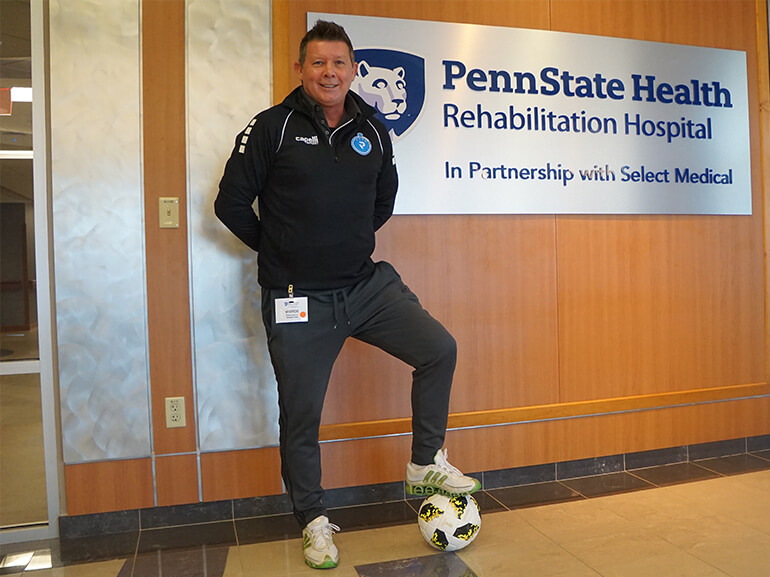Dennis' story

Denis Clarke, 50, made a successful career in athletics as a former soccer player, assistant coach of the Harrisburg City Islanders and youth soccer coach. Though in prime physical health, one day his legs gave out while shopping. The following morning, he experienced “backstabbing pain” so severe he sought medical attention in a local emergency department. Denis was told they couldn’t find anything wrong and was sent home. His symptoms and pain worsened so he returned to the emergency department that same evening and, once again, was sent home with no answers. Denis became so weak over the next few days that a friend and his girlfriend had to assist him into the car. This time, he chose to seek help at Penn State Health Milton S. Hershey Medical Center. After a series of tests, Denis found out he had Guillain-Barre syndrome, a rare neurological disorder in which the body’s immune system attacks the nerves.
While at Hershey Medical Center, a nurse friend of Denis’s sought him out and recommended Penn State Health Rehabilitation Hospital for extended recovery. He took the advice and was transferred to begin his challenging journey back.
When Denis arrived, he recalled being so weak and deconditioned that he was unable to sit up on his own. “The staff would sit me up, and I was unable to hold it. It was brutal.” He further described his extremities as “floppy” and having a left-sided facial droop. Initially, the only functional abilities Denis had were some head movement and enough function in his right hand that he could change the TV channel on the remote control with the assistance of the staff placing the remote in his hands. He even had difficulty speaking. Visitation with his beloved girlfriend, Jenny was limited at the time due to COVID-19 safety restrictions.
Physical therapists began to work with Denis utilizing an FES bike, a stationary bike that delivered low-level electrical pulses to his leg muscles to improve muscle strength, muscle memory and facilitate movement. He also used a tilted exercise platform that supported part of his body weight while performing leg exercises until he gained enough strength to do them on his own. For gait training, Denis used the LiteGait harness, a body weight support system, to improve fluidity of his gait pattern before progressing to using a rolling walker with full body weight.
In occupational therapy, Denis started with simple exercises like sitting up on the edge of the bed to work on his core strength and stability. His team focused on his arm strength and motor control as well as his ability to manipulate objects, such as holding utensils or picking up an object from his bedside tray. The first goals were for Denis to feed himself and brush his teeth with the use of built-up handles on his utensils. Then they worked on helping Denis transfer in/out of bed with the use of a transfer board or dependent lift. As Denis’s endurance improved, his therapists challenged him with more difficult tasks like bathing, putting on a shirt and using adaptive equipment to put on socks and shoes. Jenny also received training on how to assist Denis in the home with everything from getting in and out of bed to showering safety and what types of medical equipment would be required.
Denis also worked with speech therapists. His facial nerve impairments required a modified diet consisting of pureed foods and thickened liquids. During his stay, he worked on exercises to strengthen the mouth and throat and swallowing strategies to aid in safety when eating. The nerve damage also affected his speech abilities so his team worked to improve articulation and respiratory function. He engaged in tasks such as reading magazine articles aloud and scripting phone conversations while using a mirror, photos and audio recordings to mark improvements in his facial muscles and speech clarity.
Denis’s goals from the beginning were to get back to himself and to become self-reliant and fully functional again. During his stay, Denis gushed about his team, saying, “The whole team, from the nursing assistants to the physical therapists, were wonderful throughout my whole stay.” He recalls connecting with the team on a fun level and quickly learned that his role as a coach had been reversed and he was now the player. With that, Denis wanted to put out the same effort and respect that he expected of his athletes. One of Denis’s therapists worked with him on kicking a soccer ball, especially on his weaker side. Gradually he progressed from being able to kick the ball just inches to feet and then even further. There were times that Denis felt like his progress was moving at a “snail’s pace,” and he admits often feeling frustrated, but he never gave up. He would observe small increments of new abilities each day and pushed forward to see how much more he could do the following day.
Denis spent nearly one month at Penn State Health Rehabilitation Hospital, regaining strength and independence each day. Denis smiled as he talked about the team’s “positive encouragement” and “celebration of small successes.”
At the time of discharge, Denis had made tremendous gains, was able to hold his head up and had control of his extremities. Several months later, he provided an update saying, “I’m back to normal, not just in my daily life, but also in my career working with hundreds of kids at our local soccer club.” He expressed how grateful he was to be feeling “better than ever” and for the woman that was by his side through the entire journey. “I can’t thank Jenny enough for all she has done for me, not just in my most desperate times, but also how she makes me feel every day.”